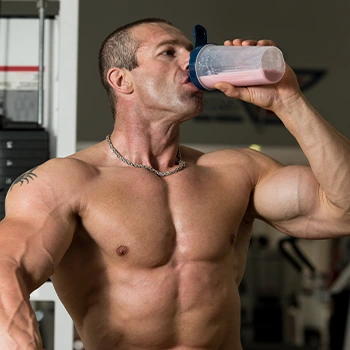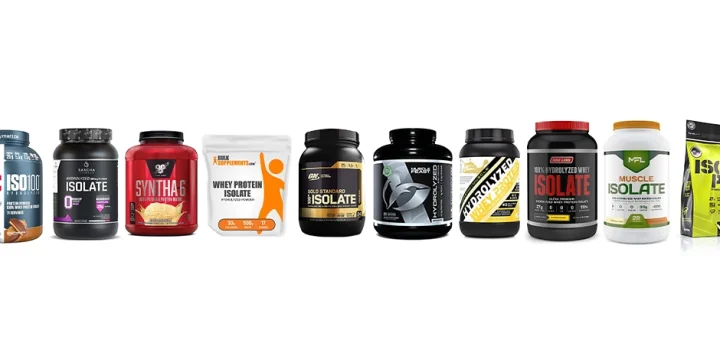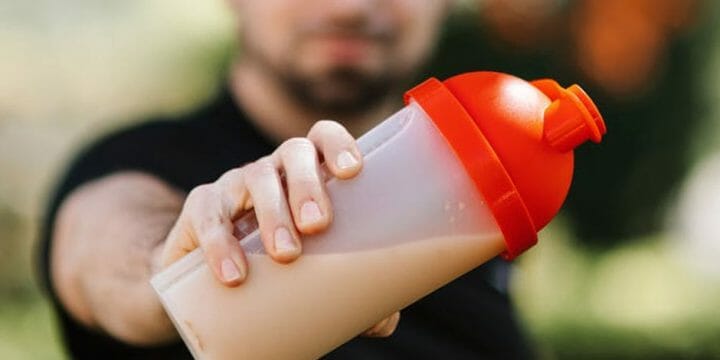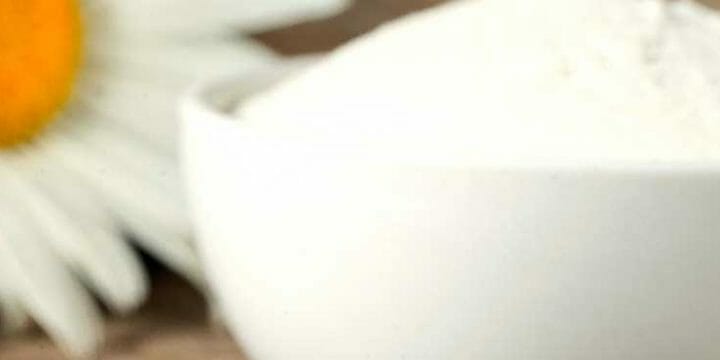Are you considering buying gym supplements? Then you’ve probably heard of good whey protein.
But you might not know what it is and whether it’s right for you.
I’ve been a coach for many years, so it’s safe to say that I know a thing or two about this powerful form of protein.
But I also partnered with a dietitian to bring you the most verified and complete information. Here’s everything you need to know about whey.
Quick Summary
- Whey protein, derived from milk, is a popular supplement for muscle building, weight loss, and cholesterol management.
- The three main types are whey protein isolate, concentrate, and hydrolysate, each with different levels of protein concentration and digestibility.
- Consuming 54 grams of whey protein daily for 12 weeks can significantly reduce total and LDL cholesterol in overweight individuals.
- As a coach, I believe whey protein is a versatile supplement that can effectively support various health and fitness goals.
What Exactly Is Whey Protein?

Whey protein is a type of milk protein. In fact, it’s one of the two most abundant types of proteins found in milk [1]:
- Casein (80%)
- Whey (20%)
When we say whey, we’re actually referring to the watery part of milk. For example, the liquid substance you can sometimes see floating when you open a yogurt is whey, according to the Healthline [2].
Whey proteins are extracted from milk during cheesemaking. Then it undergoes processing and made into a powder that's often added to shakes, meal replacements and protein bars.
Whey protein alone often has a bland taste, leading to the common practice of mixing it with liquids besides water and adding flavors. Popular choices include powders flavored with chocolate, strawberry, and vanilla.
Whey proteins consist of [3]:
- Beta-lactoglobulin
- Alpha-lactalbumin
- Bovine serum albumin
- Immunoglobulins
Whey is also considered a complete protein because it contains all nine essential amino acids.
Popular Whey Protein Powder Supplements:

3 Types Of Whey Protein

According to the MedicalNewsToday, there are three main types of whey protein, based on how it’s processed [4]:
- Whey protein isolate: Isolate is at least 90% protein. It contains fewer carbs, fat, and lactose than whey protein concentrate because it goes through more processing.
- Whey protein concentrate: Concentrate is 70 - 80% protein and is usually cheaper than isolate.
- Whey protein hydrolysate: Hydrolysate, or hydrolyzed whey, is the most expensive type of whey protein supplement. It’s pre-digested, which makes it easier to consume.
In my experience, each of the three whey types - isolate, concentrate, and hydrolysate - serves different fitness goals effectively.
Whey protein powder supplements often include all three types. For those with sensitive digestion, whey hydrolysate is recommended. However, if digestion isn't a concern, hydrolysate may not offer additional benefits over the other types, considering its higher cost.
Regarding quality, isolates are better than whey protein concentrates. Although they are a bit more expensive, the price difference is usually negligible. Isolates also contain fewer calories, carbs and fats so they’re more healthy for you overall [5].
Beyond nutrition, whey protein plays a significant role in food technology, contributing to the development of functional foods, enhancing food fortification, and offering innovative solutions for texture and flavor enhancement in culinary creations.
Benefits of Whey Protein

Here are some of the many health benefits of whey protein:
- Promotes weight loss. Whey protein can accelerate weight loss because it boosts metabolism and decreases appetite. So, whey consumers can burn more calories and feel full for longer, based on research published in PubMed Central [6].
- Decreases cholesterol. Cholesterol can cause cardiovascular diseases, so the lower it is, the better. Luckily, one study found that eating 54g of protein per day over 12 weeks reduced both total and LDL cholesterol in overweight individuals [7]. And since whey lowers cholesterol, it may simultaneously decrease the risk of heart problems.
- Builds muscle mass. Taking whey protein will equip your body with the amino acids and protein needed for muscle growth. One of those amino acids is leucine, which stimulates muscle protein synthesis [8].
May reduce the risk of cardiovascular diseases. We’ve already said that whey lowers cholesterol.
That’s one way in which it decreases the risk of heart problems. But it also does so by reducing elevated blood pressure, which offers you double protection against cardiovascular issues [9].
The impact of whey protein extends beyond physical health, based on my first hand experience and with emerging research suggesting potential benefits for mental well-being, including mood enhancement and cognitive function improvements, adding a psychological dimension to its well-known physical benefits.
Top-Rated Protein Powder Brands:
Risks of Whey Protein

The biggest health risks of whey are related to constipation and digestion. As a coach, I advise caution with whey protein, especially for those with lactose intolerance, as it can cause stomach issues like bloating and gas.
But this mainly happens when people with lactose intolerance take a whey protein supplement. So, there’s little to no reason to worry about these side effects if you tolerate milk just fine.
However, in rare cases, some individuals might experience other side effects of whey protein supplements, like [10]:
- Nausea
- Headache
- Fatigue
- Reduced appetite
- Acne
Take the right preventive measures to avoid these side effects:
- Don’t take whey protein without working out. If you take protein without being physically active, you risk damaging your liver, according to study published in PubMed [11].
- Don’t swap meals with supplements. You should still maintain a healthy and diverse diet even if you start taking supplements. You can drink whey protein every day but you shouldn't try to live off protein shakes alone.
Be mindful of the impact other ingredients have as well:
- Sugar free protein supplements help keep the calories down and are a good source of whey for diabetics.
- Protein powders without artificial sweeteners can reduce the risk of side effects like headaches.
- Low sodium whey protein supplements can help prevent going over the recommended sodium intake of 2,300 mg per day.
How Much Whey Protein Do You Need?

According to the Dietary Reference Intake, an average adult needs 0.8 grams of protein per kilogram or 0.36 grams per pound of body weight [12].
But you’ll need more if you’re physically active, and especially if you’re practicing strength training. Building muscle without protein is difficult since it's a primary source of amino acids.
It’s recommended that you consume 1.2 - 1.7 grams of protein per kilogram of body weight or 0.5 - 0.8 grams per pound if you’re trying to build muscle [13].
To determine your daily protein needs for muscle building, multiply your body weight by the recommended protein intake.
For instance, at 170 pounds, you'd need about 119 grams of protein daily (170 lbs x 0.7 g/lb). I've found that a protein calculator can be useful to calculate the total amount needed.
Although a scoop of protein powder can vary, a simple guideline is to take 1 - 2 scoops of whey protein, providing 25 - 50 grams, as part of your daily intake [14].
Recommended Whey Protein Powder Supplements:
FAQs
Can I Drink Whey Protein Without Working Out?
You shouldn’t drink whey protein without working out because it may hurt your liver. Without enough physical activity, the protein will go to your liver instead of your muscles. The liver may struggle to flush it out, which can lead to complications.
References:
- https://www.ncbi.nlm.nih.gov/pmc/articles/PMC5149046/
- https://www.healthline.com/nutrition/whey-protein-101
- https://www.medicalnewstoday.com/articles/263371
- https://www.medicalnewstoday.com/articles/263371#types
- https://www.gainful.com/blog/isolate-vs-concentrate/
- https://www.ncbi.nlm.nih.gov/pmc/articles/PMC2289832/
- https://pubmed.ncbi.nlm.nih.gov/19893505/
- https://pubmed.ncbi.nlm.nih.gov/22647249/
- http://www.sciencedirect.com/science/article/pii/S095869461000141X
- https://www.webmd.com/vitamins/ai/ingredientmono-833/whey-protein
- https://pubmed.ncbi.nlm.nih.gov/32702243/
- https://www.sclhealth.org/blog/2019/07/how-much-protein-is-simply-too-much
- https://www.acsm.org/docs/default-source/files-for-resource-library/protein-intake-for-optimal-muscle-maintenance.pdf
- https://www.healthline.com/nutrition/whey-protein-101#dosage-and-side-effects
About The Author
You May Also Like






